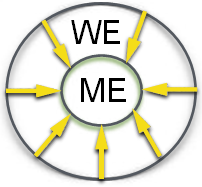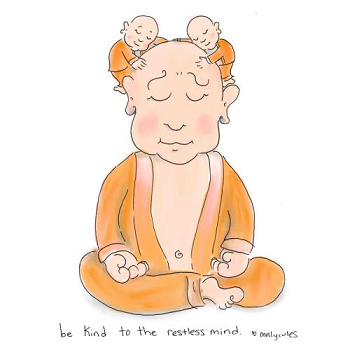ls accepting influence hoping to establish / maintain a satisfying self-defining relationship to another person or group..
Are you conforming to majority (publicly), in spite of not really agreeing with them (privately)?
Internalisation (genuine acceptance of group norms)
Consider a situation where you move to a new neighborhood . You make new friends and realise they are vegetarians. A very dear friend advocates protecting animals and has converted to vegetarianism by choice. There are equally good and more options to meat that are interesting and delicious! You readily agree to convert as you believe in valuing animal lives too…
Is accepting influence of ideas and actions intrinsically rewarding. Is adopting the induced behaviour congruent with your value system….
Are you conforming to majority (publicly) and agreeing with them (privately)?
 WE…ME
WE…ME
While conforming, changing belief or behaviour are you in any way moving from “ME” to “WE”?
How are you balancing between WE and ME… Do you feel drained, disempowered?
Is WE influencing ME significantly to impact your own power?
In identification, crucial component is attractiveness of the person with whom you identify. Are you influenced to hold same opinions even when they might not be your true self?
 In compliance, crucial component is power of the influencer to dole out rewards and punishments. What motivates you to comply?
In compliance, crucial component is power of the influencer to dole out rewards and punishments. What motivates you to comply?
In internalisation, crucial component is credibility of the person supplying the information..Is the deepest level of conformity where beliefs of the group become part of your belief system and you experience permanent change in behaviour.
 So while conforming, what are your actions, thoughts, behaviours?
So while conforming, what are your actions, thoughts, behaviours?
Few listed below..
- All or Nothing Thinking: Seeing things as black-or-white, right-or- wrong with nothing in
- Either you are part of the group or not
- Either I agree or I don’t
- Overgeneralisation: Using words like always, never in relation to a single event or
- We always agree with each other in our group
- They will never do anything contrary to our belief
- Minimising or Magnifying (Also Catastrophizing): Seeing things as dramatically more or less important than they actually Thinking of unpleasant events as catastrophes.
- I questioned an important .I will not be trusted again, I wont be given theopportunity to lead the Project
- My boss publicly thanked her she’ll get that promotion, not me (even though I had a great performance review and just won an industry award).
- “Shoulds”: Using “should”, “need to”, “must”, “ought to” to motivate oneself, then feeling guilty when you don’t follow through (or anger and resentment when someone else doesn’t follow through).
- You should spend more time with family
- I ought to align with the norms
- Labelling: Attaching a negative label to yourself or others following a single
- I didn’t understand what he was saying, I am so dumb!
- Personalising: Taking something personally that may not be Seeing events as consequences of your actions when there are other possibilities.
- He responded to my greeting with a brusque tone, maybe he is annoyed with
- Discounting the Positive: Not acknowledging the Allowing (dwelling on) one negative detail or fact
- That doesn’t count, anyone could have done
- I’ve lost 5 kgs weight of my target of It doesn’t count because I’ve not reachedmy ideal weight yet.
- Emotional Reasoning: I feel, therefore I Assuming that a feeling is true – without digging deeper to see if this is accurate.
- I feel such an idiot (it must be true)
- I feel guilty (I must have done something wrong)
- I feel really bad for yelling at my partner, I must be really selfish and inconsiderate.